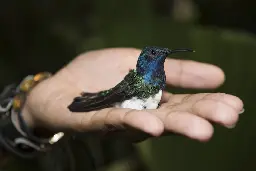Female hummingbirds are mimicking males to avoid aggression
Female hummingbirds are mimicking males to avoid aggression
Male Humming birds are not as sweet as they seem. Female hummingbirds are discussing themselves to look like males to avoid aggression. But, male hummingbirds are "willing to mate with pretty much anything", so the undercover females are still finding a mate!

When you think of a hummingbird you probably think of a small sweet bird.
But, hummingbirds are also very aggressive, especially males.
According to a new study, some female hummingbirds are evolving to look like males to avoid aggression.
Male White-necked Jacobin hummingbirds have a flashy bright blue head, iridescent green back, and a white stomach and tail.
In comparison, their female counterparts are muted in color. They have a speckled front and the iridescent olive green back. The drab colors make it easier for the females to hide with their young, from predators or other aggressive hummingbirds.
Jay Falk, a postdoctoral researcher at the University of Washington, says females are trying to deceive other aggressive hummingbirds by adopting the bright colors.
“That coloration is a signal to say to other hummingbirds, 'You better watch out. I'm a bully; if you attack me, I'm going to fight back,'" Falk said.
This results in other animals leaving the evolved female hummingbird alone.
According to Falk, only about 20% of female White-necked Jacobins engage in this behavior. It’s likely they will continue to be a minority. That’s because, if less aggressive females adopt the brighter colors, which typically signals aggressive behavior, the meaning of the colors change. Once the meaning changes, there is no benefit in the females changing to the flashy colors. It puts them at risk, as it is easier to spot them hiding with their young.
You may be wondering, "If a female hummingbird looks like a male, won't it make finding a male to mate with difficult?"
Falk says the undercover male-looking female hummingbird will likely still find a male mate.
“The males are willing to mate with pretty much anything," Falk said. "There's videos of males trying to mate with a lump in a tree. So, I don't personally think that these females that look like males have any trouble getting mates.”